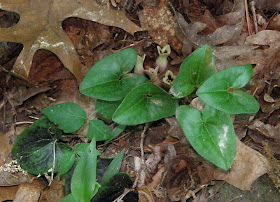The woods are covered with a thick layer of leaf litter and I wasn’t sure when these plants would flower in this area. In late April, I carefully cleared away some leaves surrounding a couple of plants and found the flowers beneath them. After I photographed them I replaced the leaves. I watched each week and, over time, flowers of a couple of flowers were observable without removing leaves but must remained covered.
 A young plant with typical heart-shaped leaves with distinctly lighter patches between the veins.
A young plant with typical heart-shaped leaves with distinctly lighter patches between the veins. Flowers are almost white with a purple tinge. (An older leaf in the upper left appears almost black).
Flowers are almost white with a purple tinge. (An older leaf in the upper left appears almost black). Another view of flowers.
Another view of flowers. A close up of flowers. These flowers are green with a purple tinge.
A close up of flowers. These flowers are green with a purple tinge.Hexastylis arifolia is native to the United States. Their range is states south and east from Virginia and Kentucky south to Louisiana.
Click on an image to view a larger image
Distribution Map:
- United States Department of Agriculture Plants Database: Hexastylis arifolia (Littlebrownjug)
- University of North Carolina Herbarium: Hexastylis arifolia
Identification resources:
- Southeastern Flora: Wild Ginger (Hexastylis arifolia)
- Natural and Naturalized Plants of the Carolinas and Georgia: Hexastylis arifolia
- Alabama Plants: Hexastylis arifolia
Related posts:
- 2010: Year Of The Wildflower
Interesting - this is a different species than the one that goes by the name wild ginger in Ohio. Ours is Asarum canadense, I believe.
ReplyDeleteI suspect many plants go under the common name Wild Ginger and refer to different genera and species - which is why the scientific names are so important.
ReplyDeleteI'm a little envious. Asarum canadense has such a pretty flower compared with Hexastylis arifolia but we have what we have and I'm glad to have found so many plants of this one.